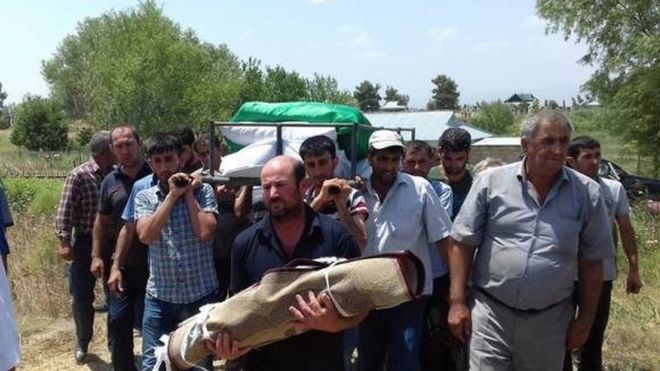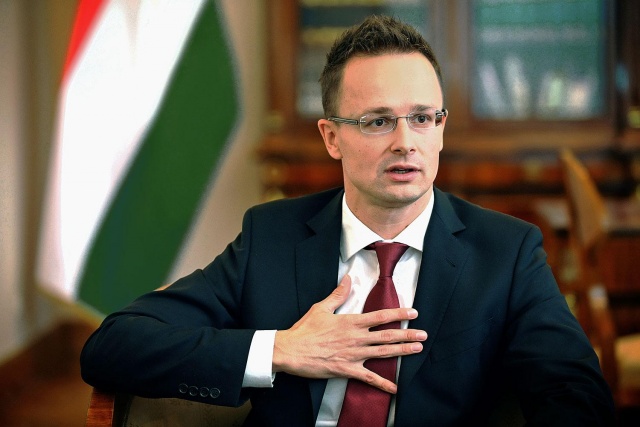
BBC 5 July 2017
A young girl and her grandmother died when Armenian-backed troops shelled a village in Azerbaijan.
The violence erupted on Tuesday night close to the breakaway region of Nagorno-Karabakh, an ethnic Armenian-controlled enclave in Azerbaijan.
The toddler, who was two, was named as Zahra Guliyeva.
Azerbaijan accused Armenia of targeting civilians. Karabakh officials said they had returned fire, accusing Azerbaijan of deploying weapons near civilians.
The two victims were buried beside each other just outside the village on Wednesday. The toddler's grandmother was named as Sahiba Allahverdiyeva, aged 51.
The two died when a shell hit a house in the village of Alkhanli in the Fizuli area of Azerbaijan on Tuesday evening. A second woman was wounded.
The foreign ministry in the Azerbaijan capital Baku said the village had been hit by mortar rounds and heavy grenade launchers.
Nagorno-Karabakh spokesman Senor Hasratyan expressed "pain and regret" at the toddler's death. However, officials accused Azerbaijan of positioning rocket launchers close to villages and said they had to take responsibility.
How did the conflict begin?
At the heart of the dispute surrounding Nagorno-Karabakh is a centuries-old dispute.
Both Armenians and Azeris consider the region to be theirs, culturally and historically. The mountainous enclave is about 4,400 sq km (1,700 sq miles).
Under the Soviets, the region was populated largely by ethnic Armenians, as an autonomous region within Azerbaijan. As the Soviet Union began to disintegrate, the ethnic Armenians sought unification with Armenia, which led to war in the 1990s.
Ethnic Azeris fled Karabakh and Armenia while ethnic Armenians fled the rest of Azerbaijan.
Some 30,000 people died and hundreds of thousands of ethnic Azeris were displaced from the region and several other neighbouring areas. No peace deal has ever been signed and violence has flared up sporadically in recent years.
In April 2016, deadly clashes lasted for four days before a ceasefire was agreed.
Nagorno-Karabakh has never been recognised as independent by the international community, but it is backed by Armenia.
No comments yet.
-
 AZERBAIJAN TODDLER KILLED IN NAGORNO-KARABAKH SHELLING
The Caucasus and Turkish-Armenian Relations
06.07.2017
AZERBAIJAN TODDLER KILLED IN NAGORNO-KARABAKH SHELLING
The Caucasus and Turkish-Armenian Relations
06.07.2017
- AMNESTY WARNS THAT 'RECKLESS' EU POLICY PUTS MEDITERRANEAN MIGRANTS AT RISK Europe - EU 06.07.2017
- EU COUNTRIES LACK INVESTMENT STRATEGY IN SHIFT TO LOW-CARBON ECONOMY: EEA Europe - EU 06.07.2017
- IRAQ: 500 CIVILIANS EVACUATED FROM WESTERN MOSUL Iraq 06.07.2017
-
 HUNGARY WILL RECEIVE GAS THROUGH BULGARIA IN 2019
The Balkans
06.07.2017
HUNGARY WILL RECEIVE GAS THROUGH BULGARIA IN 2019
The Balkans
06.07.2017
-
25.01.2016
THE ARMENIAN QUESTION - BASIC KNOWLEDGE AND DOCUMENTATION -
12.06.2024
THE TRUTH WILL OUT -
27.03.2023
RADİKAL ERMENİ UNSURLARCA GERÇEKLEŞTİRİLEN MEZALİMLER VE VANDALİZM -
17.03.2023
PATRIOTISM PERVERTED -
23.02.2023
MEN ARE LIKE THAT -
03.02.2023
BAKÜ-TİFLİS-CEYHAN BORU HATTININ YAŞANAN TARİHİ -
16.12.2022
INTERNATIONAL SCHOLARS ON THE EVENTS OF 1915 -
07.12.2022
FAKE PHOTOS AND THE ARMENIAN PROPAGANDA -
07.12.2022
ERMENİ PROPAGANDASI VE SAHTE RESİMLER -
01.01.2022
A Letter From Japan - Strategically Mum: The Silence of the Armenians -
01.01.2022
Japonya'dan Bir Mektup - Stratejik Suskunluk: Ermenilerin Sessizliği -
03.06.2020
Anastas Mikoyan: Confessions of an Armenian Bolshevik -
08.04.2020
Sovyet Sonrası Ukrayna’da Devlet, Toplum ve Siyaset - Değişen Dinamikler, Dönüşen Kimlikler -
12.06.2018
Ermeni Sorunuyla İlgili İngiliz Belgeleri (1912-1923) - British Documents on Armenian Question (1912-1923) -
02.12.2016
Turkish-Russian Academics: A Historical Study on the Caucasus -
01.07.2016
Gürcistan'daki Müslüman Topluluklar: Azınlık Hakları, Kimlik, Siyaset -
10.03.2016
Armenian Diaspora: Diaspora, State and the Imagination of the Republic of Armenia -
24.01.2016
ERMENİ SORUNU - TEMEL BİLGİ VE BELGELER (2. BASKI)
-
AVİM Conference Hall 24.01.2023
CONFERENCE TITLED “HUNGARY’S PERSPECTIVES ON THE TURKIC WORLD"









